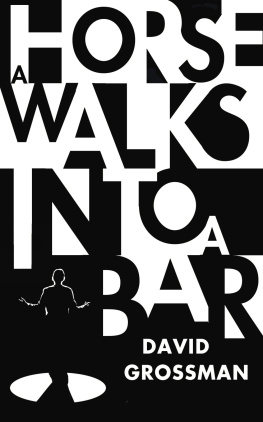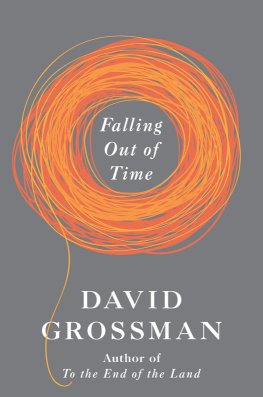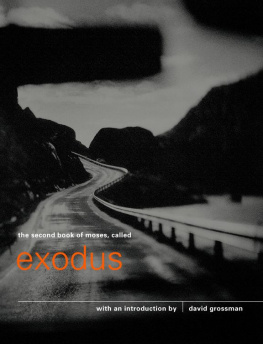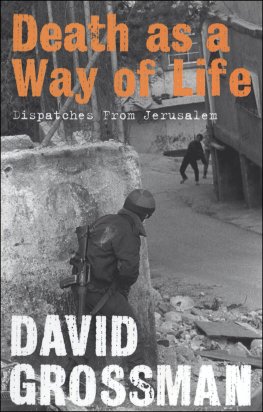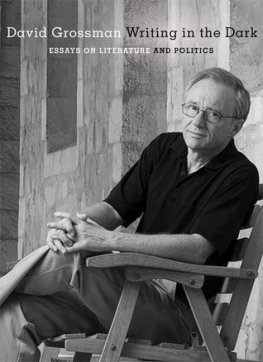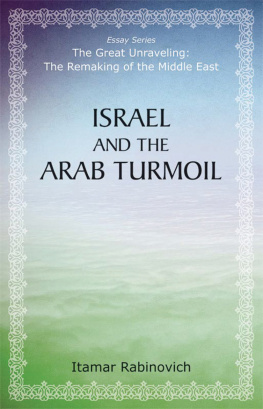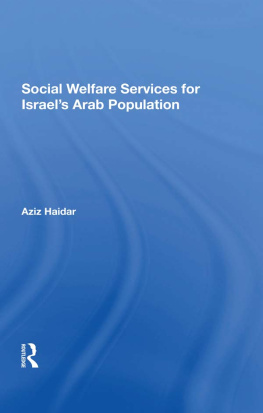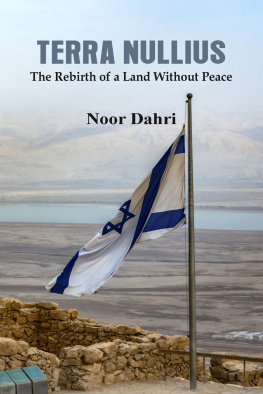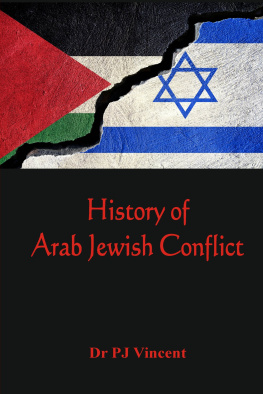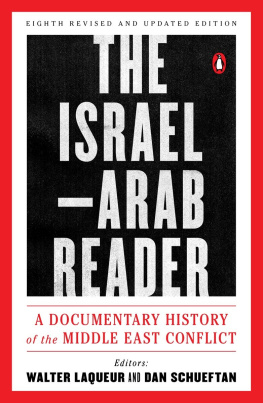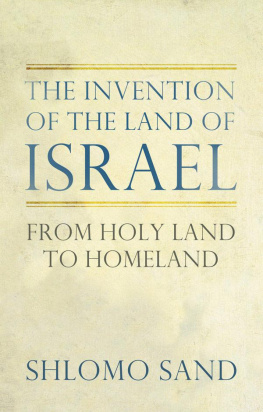Contents
About the Book
Israel: Jewish state and national homeland to Jews the world over. But a fifth of its population is Arab, a people who feel themselves to be an inseparable part of the Arab nation, most of which is still technically at war with the State of Israel.
In the summer of 1991 David Grossman set out on a journey into the world of Arab citizens of his country. Sleeping on a Wire is an account of what he found. It is about men and women fighting to find a voice, to pick out the pulse of their own identity in a land that doesnt seem to be theirs. He has not written about open conflict. Rather it is a story of ferment beneath the surface, and an intensifying bitterness which can only exacerbate the troubles of the Middle East.
About the Author
David Grossman was born in Jerusalem. He is the author of numerous works of fiction, nonfiction and childrens literature. His work has appeared in The New Yorker and has been translated into twenty-five languages around the world. He is the recipient of many prizes, including the French Chevalier de lOrdre des Artes et des Lettres, the Buxtehuder Bulle in Germany, Romes Premio per la Pace e lAzione Umitaria, the Premio Ischia International Award for Journalism, Israels Emet Prize, and the Albatross Prize given by the Gnter Grass Foundation.
Also by David Grossman
Fiction
In Another Life
Someone to Run With
Be My Knife
The Zigzag Kid
The Book of Intimate Grammar
See Under: Love
The Smile of the Lamb
To The End of the Land
Lions Honey: The Myth of Samson
Non-Fiction
Writing in the Dark: Essays on Literature and Politics
Death as a Way of Life: Israel Ten Years After Oslo
PROLOGUE
One hot night in July 1991, I visited a summer camp in the Lavie Forest. Israeli boys and girls, Jews and Arabs, were standing and debating the states treatment of its Arab citizens, the Arabs disregard of Israels complex predicament, the way the army fights the intifadah. With righteous wrath and youthful charm they hammered home their arguments, worn from overuse. As I watched them, I could not tell by sight who was Jewish and who was Arab. Their features are similar, their clothes and hair styled by the dictates of the same fashions; even their body language is the same, as is the Hebrew they speak. Only the accent is different. I recalled that I had already participated in such an eventwhen I was their age, more or less, in a Jewish-Arab summer camp in Acre. Then, more than twenty years ago, we might have been distinguished from each other by our dress, language, and degree of contentiousness during a debate, but what has not changed since then is the sharpness of mutual emotion, the powerful need to have this particular individual understand you and confirm your feelingsand the awkwardness and illusion, because at times he is close by, that individual, and then suddenly he is far away, and how can someone so close to me be so wrong about me; how can someone so distant know me so well?
The circle of disputants opened abruptly. A boy of perhaps fourteen, who stood on the outside, was thrust toward me, and a trail of whispers rose and swooped after him. Hes the one who ran away, someone said in an undertone, and the debate instantly died.
We sat with him all day, three Jews, three Arabs, a boy named Itai explained. We talked with him, made him think.
The boy, M., listened to what was being said about him. He was a somewhat clumsy, pale type, his movements guarded, his gaze older than his age.
It hurt me that M. ran away, said Sana, from Acre. It was important to me that he stay here, that we change preconceptions together. Because there were two Jewish girls here, right-wing, and they decided to go home
Murmurs of agreement, Jewish and Arab, and a slight, common sense of pride. I asked M. why he had come to the camp.
To have a good time. For a vacation, he responded, caught up in himself but apparently not at all put off by the interest he was attracting. I read that it was a camp for Jews and Arabs, but I didnt realize it was Jews and Arabs together so much. And Ibefore that, what can I say, being with Arabs really didnt grab me. While he spoke the others were silent, drawn by the confession. So I came, and right away I saw that its really together. More than I thought. Them and us together all the time. Even at night. And I started feeling uneasy.
An Arab boy named Basel asked if he had known Arabs before.
Yes. I was with Arabs once, but not like this. I was with my grandfathers laborers. But with them it was different, and here it became clear to meI didnt especially like the idea of sleeping together, me and them, in the same tent.
It didnt bother me to sleep together with Jews, Basel objected.
I M. hesitated. At night I couldnt take it anymore I went behind the tents, until I found a hole in the fence, and I left.
I thought of the way through the forest to the campa steep, narrow road between pine trees, the caves, the jagged rocks.
We warned him not to leave, Itai said. The forest is full of old wells you could fall into at night.
It was after nine oclock, M. continued in a low voice, in awe of himself, as if only as he spoke did he comprehend what had actually happened. It was pitch black. No one saw me leave. I went through the fence, hunched over, so they wouldnt see, into the forest.
The young people were transfixed by his white face. The strange story stripped them of their youthful cockiness, and for a moment they looked like children. Beyond the small, tight circle, the camp seemed like a far-off memory. Light bulbs weakly illuminated the cots, adolescents walked down the path from the shower; in one of the tents a boy preened in front of a girl, and on the bed right next to them another girl lay on her belly, buried in a book.
But what exactly were you scared of? Sana whispered, a lock of hair in her mouth.
I was scared, you think I know why? That they might rob me. That theyd do something to me I felt really uneasy about it, he said, shrugging his shoulders apologetically. I mean, about the tent, being the only Jew, and everyone around me an Arab. That we have to be together, for real.
And did you know where you were going? asked a voice out of the darkness.
More or less not exactly. I walked to where I thought thered be a main road, and I thought Id wait until morning and find a bus to go home to Jerusalem.
Did you know the way?
I knew I had to go down. I got so mixed up.
Did you find the road?
The police found me by the road.
They found him in a total daze, crying, whispered a girl behind me.
How long did you wander like that?
I dont know.
Werent you scared in the forest?
Sure I was scared, M. said, but I was more scared in the tent.
Out of consideration for the reader who does not know Arabic, names and terms from that language are not transliterated scientifically.
The Jews dont know enough about us. They dont even want to know that theres another nation here. Who really cares what I feel? Who will want to read your book about us? But its our fault, too, for not even trying to let you know who we are. We didnt bother. Maybe because we have a feeling that the authorities know everything about us anyway. Theyre the bosses, you know, the security agents, the state, the Ministry of Education, and its as if theyve already settled everything for us in advance. Theyve already planned out our future, and all thats left for us is to toe the line. And we really toe it. Thats how weve demeaned and wronged ourselves
Next page

